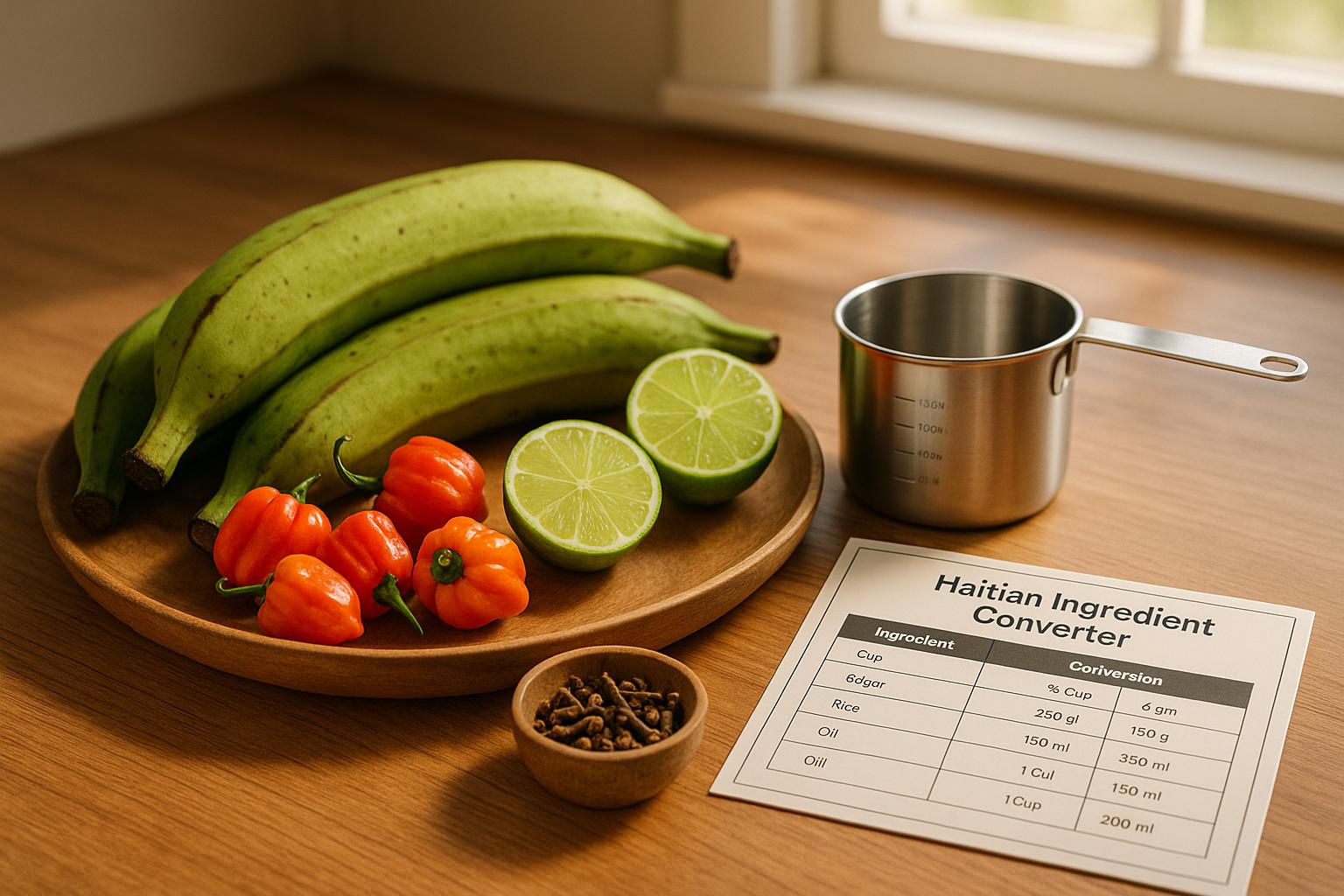Soup Joumou, often called "Freedom Soup", is more than just a meal - it’s a symbol of Haitian independence and resilience. On January 1, 1804, Haiti became the first free Black republic, breaking free from French colonial rule. This pumpkin-based soup, once forbidden to enslaved Africans, became a powerful expression of liberation when Haitians shared it to mark their newfound freedom.
Key Points:
- Historical Significance: Enslaved Haitians were banned from eating Soup Joumou, a dish reserved for French colonizers. After independence, it became a symbol of defiance and unity.
- January 1 Tradition: Haitians worldwide prepare and share this soup every New Year’s Day to honor their ancestors and celebrate independence.
- UNESCO Recognition: In 2021, Soup Joumou was added to UNESCO's Intangible Cultural Heritage list, highlighting its importance in Haitian history.
This dish connects Haitians globally, preserving their history and celebrating their enduring spirit.
Colonial History and Symbolism
Soup Joumou in Colonial Saint-Domingue
During the French colonial era in Saint-Domingue, the story of Soup Joumou reveals the stark inequalities of the time. Enslaved Africans, who made up the majority of the population, were responsible for cultivating the squash that formed the soup’s base. Yet, they were strictly forbidden from tasting the dish they helped create.
By 1789, Saint-Domingue’s population included about 556,000 people, of which 500,000 were enslaved Africans. In contrast, only 32,000 European colonists and 24,000 affranchis (free people of color) enjoyed privileges [3]. Despite their overwhelming numbers, enslaved Africans were denied basic dignities, including the right to consume the food they labored to prepare.
"Pumpkin was a luxury during the times of slavery in Haiti. It signified opulence and wealth, and the slave masters were the only ones who were allowed to consume pumpkin soup", says Cindy Similien-Johnson [4].
The French colonizers used food restrictions as a deliberate strategy to maintain their dominance. Enslaved Africans spent hours preparing, cooking, and serving Soup Joumou for their masters, fully aware they would never be allowed to enjoy it themselves. This exclusion served as a powerful reminder of their subjugation, laying the groundwork for the soup’s later transformation into a symbol of freedom.
From Oppression to Liberation Symbol
When Haiti broke free from colonial rule, Soup Joumou’s meaning shifted dramatically. During slavery, banning the soup from the enslaved population was a calculated move to assert control. As cultural anthropologist Bertin Louis Jr. from the University of Kentucky explains:
"The soup was a symbol of status, and by banning enslaved Africans from consuming it, the French were able to assert their superiority, challenge the humanity of Black Africans, uphold white supremacy and exert colonial violence" [2].
After Haiti declared independence on January 1, 1804, the soup became a symbol of defiance and liberation. No longer forbidden, it was embraced as a celebration of freedom. For the newly freed Haitians, Soup Joumou was more than just a meal - it was a reclamation of their humanity and dignity. The island’s economy had been built on the backs of nearly 800,000 enslaved Africans [2]. By sharing this once-prohibited dish, Haitians celebrated not only their political independence but also the resilience and worth of their people.
"In essence, whenever I had a spoonful of pumpkin soup on New Year's Day, I was swallowing independence. I was not only reaffirming my independence but also celebrating the independence of my ancestors, who were courageous, fearless, and resilient" [4].
Soup Joumou in Independence Celebrations
The First Sharing on January 1, 1804
When Haiti declared its independence on January 1, 1804, Soup Joumou became more than just a dish - it became a powerful symbol of freedom. For generations, enslaved Haitians were forbidden from eating this soup, which was reserved for their oppressors. But with independence, they reclaimed it as a bold statement of liberation and humanity.
On that historic day, newly freed Haitians gathered to share bowls of Soup Joumou, turning the act of eating into a profound declaration of dignity and self-worth. This shared meal was a way to reclaim what had been denied to them under colonial rule - a moment of unity and celebration.
Cultural anthropologist Bertin Louis Jr. from the University of Kentucky captures the soup's deeper meaning:
"The soup represents the claiming and reconfiguration of a colonial dish into an anti-colonial symbol of resistance and also Black freedom, specifically Haitian freedom" [2].
This pivotal moment set the stage for the enduring traditions surrounding Soup Joumou today.
Modern Independence Day Traditions
Today, Haitians worldwide celebrate Haitian Independence Day on January 1 by preparing and enjoying Soup Joumou [2]. This tradition has grown into a powerful ritual that connects Haitians everywhere, serving as a reminder of their shared history and identity.
Families often enjoy the soup multiple times throughout the day - at breakfast, lunch, and dinner - and many continue the tradition into January 2, known as Ancestors' Day [2]. This extended celebration highlights the soup's importance in linking present-day Haitians to their past.
Preparing and sharing Soup Joumou has become a family and community event, fostering a sense of togetherness. Haitian chef and author Nadege Fleurimond emphasizes this unity:
"Whenever January 1 comes around, [Haitians] have this one anchor point of the soup. It reminds us of what we've done, what's still possible if we do come together and also that sense of community that's authentically felt. It's more than just the household that's making the soup - it also extends to the entire community, and every Haitian in the world that is making this soup. This just shows we really are one" [2].
Haitian restaurants have also embraced the tradition, often offering free Soup Joumou on New Year's Eve to celebrate Haitian culture and educate others about its significance [2]. For nearly a decade, Fred Raphael, co-owner of First Republic Lounge and Restaurant in New Jersey and Rebèl Restaurant and Bar in New York, has given away free bowls of the soup, attracting 300 to 500 guests each year [2]. Similarly, Wesly Jean Simon, chef-owner of Brooklyn's Djon Djon and Market Bar, distributed 900 cups of free Soup Joumou in December 2024 and plans to share 2,000 cups in December 2025, focusing on introducing non-Haitians to Haitian history and traditions [5].
For Raphael, the soup carries a profound message:
"[Soup joumou] is freedom in every bowl. [Haitians] fought for unity, just the same way we get all these different ingredients that come together and create this taste" [2].
The tradition has also adapted to modern times, with social media playing a role in spreading recipes and sparking debates about the "right way" to make Soup Joumou [2]. Contemporary versions often include ingredients like rigatoni or penne pasta, which likely weren’t part of the original recipe [2]. While the dish evolves, its core meaning as a symbol of freedom and unity remains unchanged.
Modern Importance and Practices
Expression of Haitian Identity
Soup Joumou has grown beyond its origins to become a symbol of Haitian identity and heritage, resonating deeply with both locals and the diaspora. For Haitians, whether living in Haiti or abroad, this dish is much more than a meal - it’s a powerful reminder of their roots and a source of immense pride.
The soup’s importance lies far beyond its ingredients. It represents resilience, freedom, and the enduring spirit of those who overcame oppression. Every January 1, Haitians come together to share bowls of Soup Joumou, participating in a cherished tradition that honors their ancestors and reaffirms their identity as descendants of those who fought for independence.
"What makes soup joumou so special to Haitians is its emotional history, its cultural value, and its role in preserving national identity. It is much more than just a dish: it is an act of remembrance, a tribute to ancestors, and a symbol of emancipation." [6]
The significance of Soup Joumou isn’t confined to New Year’s Day. On December 31, families gather to prepare the soup together, strengthening community ties and reflecting the unity and cooperation that were essential during Haiti’s fight for freedom. This collective effort and shared cultural pride have paved the way for global recognition.
UNESCO Recognition and Preservation

In 2021, UNESCO added Soup Joumou to the Representative List of the Intangible Cultural Heritage of Humanity [1]. This honor not only highlights the soup’s cultural value but also ensures that its traditional preparation is preserved for generations to come.
UNESCO’s description of the dish captures its essence:
"Joumou or giraumon soup is a traditional Haitian pumpkin soup made with vegetables, plantains, meat, pasta and spices. It is a celebratory dish, deeply rooted in Haitian identity, and its preparation promotes social cohesion and belonging among communities." [1]
This recognition has brought global attention to Haitian culture. Cultural organizations are now working to document traditional recipes and preserve oral histories, ensuring that future generations understand not just how to make the soup, but why it holds such deep meaning. For many Haitians, UNESCO’s acknowledgment is seen as an overdue validation of their culture’s impact on world history.
Haiti’s historic achievement as the first nation to abolish slavery and establish a Black republic in 1804 [6] is a legacy that Soup Joumou continues to celebrate. UNESCO’s recognition reinforces the soup’s role as a symbol of freedom, unity, and the enduring strength of the Haitian people.
sbb-itb-80c33ff
Ingredients, Preparation, and Variations
Key Ingredients and Their Roles
Soup Joumou isn’t just a dish - it’s a celebration of Haitian resilience and unity, with every ingredient carrying its own significance. At the heart of this soup is calabaza squash, which gives it that vibrant color and creamy texture. Beef provides a rich, protein-packed base, simmered slowly to create a deeply flavorful broth. A medley of vegetables - like carrots, potatoes, turnips, celery, leeks, and cabbage - adds layers of flavor and nutrients. Plantains lend a hint of sweetness, while pasta (often rigatoni or penne) makes the soup hearty and filling. To tie it all together, a mix of thyme, parsley, cloves, garlic, onion, and Scotch bonnet pepper delivers the bold, complex flavors that define the dish.
According to historical accounts, Empress Marie-Claire Heureuse Félicité [7] carefully selected these ingredients to symbolize Haiti’s triumph over oppression. This thoughtful combination reflects the unity and strength forged during the country’s fight for freedom.
The Communal Preparation Process
The process of making Soup Joumou is as meaningful as the dish itself, bringing families together in a shared tradition. Elders often lead the way, teaching younger generations the techniques passed down over time. Everyone plays a role: chopping vegetables, blending the squash, and perfecting the seasoning. It all starts with a slow-simmered beef broth, gradually enriched with the other ingredients. Adjusting the flavors - especially the heat from the Scotch bonnet pepper - is a skill seasoned cooks take pride in, ensuring every batch is perfectly balanced and unforgettable.
Regional and Diaspora Variations
Though the core ingredients stay consistent, Soup Joumou recipes often vary based on family traditions and local influences. As health administrator and YouTube personality Lamise Oyugi explains:
"Everyone makes it differently, and it's the familiar method passed down through families." [8]
In Haitian diaspora communities, families adapt the recipe to include ingredients available in their new locations, ensuring the dish remains accessible while preserving its symbolic essence. No matter how it’s prepared, the shared heritage and deep meaning of Soup Joumou remain constant, connecting people to their roots and history.
The Legacy of Soup Joumou
Reflection on Haitian Resilience
Soup Joumou holds a profound place in Haiti's history, symbolizing the nation's hard-fought freedom. Once restricted to the tables of colonizers, this cherished dish has become a powerful emblem of Haitian defiance and unity. Over two centuries after Haiti declared independence, Soup Joumou remains a vivid reminder of the nation's resilience and its enduring fight for liberty.
This transformation from a symbol of oppression to one of liberation reflects the heart of Haiti's revolutionary triumph. It’s not just a culinary tradition - it’s a declaration of dignity and self-determination. UNESCO’s recognition of Soup Joumou has amplified its importance on a global scale, cementing its place as a cultural treasure.
But the soup’s significance isn’t confined to New Year’s Day celebrations. As Haitian chef and cookbook author Nadege Fleurimond explains:
"Whenever January 1 comes around, [Haitians] have this one anchor point of the soup. It reminds us of what we've done, what's still possible if we do come together and also that sense of community that's authentically felt. It's more than just the household that's making the soup - it also spreads to everyone in your community making the soup, and every Haitian in the world that is making this soup. This just shows we really are one." [2]
The tradition of Soup Joumou bridges generations and unites Haitians across the globe. Whether it’s the yams added in the Grand Anse region, the rice included in the Artibonite Valley, or the families in Port-au-Prince savoring it every Sunday [9], the soup evolves while preserving its symbolic essence. In diaspora communities, it continues to adapt, reinforcing a shared Haitian identity no matter where it’s prepared.
Discover Haitian Cuisine with HaitianFoods.org

As traditions evolve, the rich culinary heritage of Haiti finds new ways to thrive in modern contexts. Soup Joumou is just one example of Haiti’s vibrant food culture, and for those eager to explore more, HaitianFoods.org serves as a gateway to the nation’s diverse culinary landscape.
This online resource connects food enthusiasts to authentic Haitian restaurants worldwide, making it easier to enjoy traditional flavors while supporting Haitian-owned businesses. Beyond just listings, the platform dives into the stories and cultural roots behind each dish, offering a deeper appreciation for Haiti’s food traditions - much like the story of Soup Joumou.
Restaurant owners can also submit their establishments to HaitianFoods.org, helping to build a global network of Haitian culinary hubs. By connecting diners to authentic Haitian cuisine, the platform celebrates the same spirit of community and perseverance that Soup Joumou represents, ensuring these cultural traditions continue to thrive for generations to come.
The Revolutionary Roots of Haitian Soup Joumou
FAQs
Why weren’t enslaved Africans allowed to eat Soup Joumou during French colonial rule in Haiti?
During Haiti's French colonial period, Soup Joumou was a dish strictly reserved for the French colonists. Enslaved Africans were prohibited from eating it, a deliberate act meant to emphasize their subjugation and deny them access to symbols of privilege. The soup, with its rich ingredients and deep cultural meaning, became a clear marker of social status, and withholding it reinforced the colonists' control.
However, this restriction turned Soup Joumou into something far more significant. When Haiti achieved independence in 1804, the soup was reclaimed by the people as a powerful emblem of freedom and equality. It became a national dish, celebrated not just for its flavor but for its role in symbolizing the strength, unity, and resilience of the Haitian people.
How has the tradition of making and sharing Soup Joumou changed among Haitian communities abroad?
For Haitian communities living abroad, the tradition of making and sharing Soup Joumou has become a heartfelt way to preserve their heritage and celebrate the enduring spirit of freedom. Every year on January 1st - Haiti's Independence Day - families and friends gather to prepare this beloved pumpkin-based soup. While the recipes may be tweaked to suit the ingredients available locally, the dish’s profound historical and cultural significance remains intact.
These gatherings, whether in the comfort of homes or at larger community events, play a vital role in keeping the tradition alive. They strengthen bonds, instill pride, and reinforce a shared Haitian identity. For many, Soup Joumou is far more than just a meal - it’s a living symbol of resilience and independence, lovingly passed down through generations.
Why is Soup Joumou recognized by UNESCO, and what does it mean for Haitian culture?
UNESCO added Soup Joumou to its list of Intangible Cultural Heritage in 2021, recognizing its deep ties to Haitian independence and its powerful symbolism of freedom. This recognition not only honors the dish's historical and cultural significance but also helps safeguard it as an essential part of Haiti's identity.
By bringing global attention to Soup Joumou, this acknowledgment ensures that the tradition of making and sharing this dish continues to thrive across generations. It also shines a light on the resilience and rich heritage of the Haitian people, inspiring pride and respect for their unique cultural legacy.


